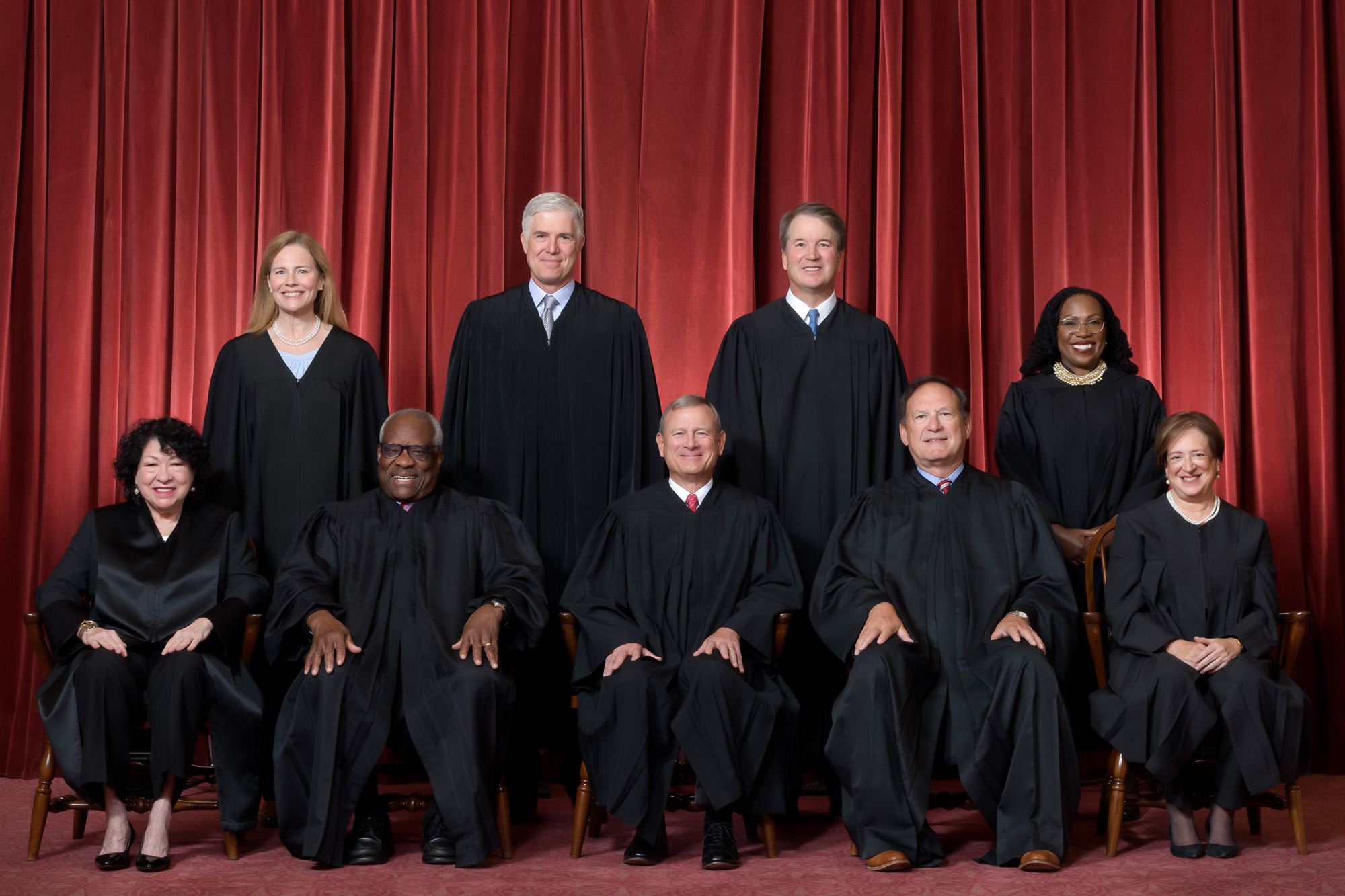Nicholas Johnson
The Gazette, January 30, 2024, p. A6
Ever heard of Bryan Berg? Me neither.
Iowa State graduate and faculty member, Brian Berg, collects world records for number of playing cards in a house of cards. In 2010 he spent 44 days constructing a replica of the Venetian Macao with 218,000 cards.
Now imagine you created that playing card replica and pranksters think it cool to smash it and watch all 218,000 cards flutter down.
Why do I ask you to imagine?
Because that’s the best analogy I can think of for the Supreme Court’s stretching its long arm of the law into matters the Constitution considers political. Stirring this poisonous stew, bubbling on the back burner behind the curtain, that will forever change our lives. [Photo credit: Supreme Court Historical Society. See, "SOURCES," below for names of current Justices.]
The Constitution leads with, “All legislative Powers herein granted shall be vested in a Congress of the United States, which shall consist of a Senate and House of Representatives.” Art. I, Sec. 1.
For the last 40 years the Court has followed its unanimous holding in the Chevron case, giving deference to “reasonable” agency interpretations of laws. (“Policy arguments . . . should be addressed to legislators or administrators, not to judges. The EPA's interpretation of the statute . . . represents a reasonable accommodation . . . and is entitled to deference.”)
Congress publishes its laws in the 60,000-page U.S. Code. Few Representatives and Senators have the time to read all of them, let alone enforce their daily administration. What do they do? They create agencies with the power to administer the laws, to write and enforce nearly 200,000 detailed regulations in 242 volumes – under Congress’ watchful eye.
This column is not a legal opinion. But it does draw on experience: Supreme Court law clerk, associate at corporate law firm, head of executive branch agency (MARAD), commissioner of regulatory commission (FCC), presidential advisor, reformer. To borrow from Joni Mitchell, “I’ve looked at Chevron from all sides now.”
My conclusion? Chevron got it right.
In 2022 four percent of the House and Senate candidates received $1 billion in political contributions. Four billion was spent on 12,000 lobbyists. Big corporations need not violate the law because they help write the law – and help select the heads of agencies. Employees move from companies to agencies and back again. Business neither deserves nor needs the Court’s help.
There are already plenty of checks on agencies’ abuses of their power. Congress writes the laws and shapes the agencies’ powers. It hears the complaints of big business – and too often yields. Congress can always change any law or agency regulation. Each agency gets annual congressional oversight by budget and oversight sub-committees.
Big corporations already have too much control over what the Constitution and prior Supreme Courts have ruled is the sole responsibility of Congress. That business keeps knocking on the Supreme Court’s door to grub for more would be as hilarious as a Kathleen Madigan stand-up routine if it were not so outrageous, dangerous, unconstitutional – and costly.
Nicholas Johnson believes, with Winston Churchill, that a constitutional democracy is the least-worst form of government. mailbox@nicholasjohnson.org
(Names:
"Front row, left to right — Associate Justices Sonia Sotomayor, Clarence Thomas, Chief Justice John G. Roberts, Jr., Associate Justices Samuel A. Alito, Jr. and Elena Kagan.
Back row — Associate Justices Amy Coney Barrett, Neil M. Gorsuch, Brett M. Kavanaugh and Ketanji Brown Jackson.")
Bryan Berg “Bryan Berg,” Wikipedia, https://en.wikipedia.org/wiki/Bryan_Berg (“In 2010, Berg exceeded his own record by using over 218,000 cards to construct a replica of the Venetian Macao, which took 44 days.”)
Constitution and Congress U.S Constitution, Art. I, Sec. 1, “The Constitution of the United States: A Transcription,” America’s Founding Documents, National Archives, https://www.archives.gov/founding-docs/constitution-transcript (“All legislative Powers herein granted shall be vested in a Congress of the United States, which shall consist of a Senate and House of Representatives.” Art. I, Sec. 1.)
Art. I, Sec. 8 contains 18 clauses; e.g., General Welfare; Spending and Commerce; Post Offices; Copyright; Maritime, Military and War Powers
“Art. I, Sec. 8: The Congress shall have Power [Clause 1] . . .. To make all Laws which shall be necessary and proper for carrying into Execution the foregoing Powers, and all other Powers vested by this Constitution in the Government of the United States, or in any Department or Officer thereof.” [Clause 18.])
Chevron Chevron U.S.A., Inc. v. NRDC, 467 U.S. 837 (June 25, 1984), Justia, U.S. Supreme Court, https://supreme.justia.com/cases/federal/us/467/837/ (“Annotation, Primary Holding: A government agency must conform to any clear legislative statements when interpreting and applying a law, but courts will give the agency deference in ambiguous situations as long as its interpretation is reasonable.”) (pp. 859-866. “Parsing the general terms in the text of the amended Clean Air Act -- particularly the provisions of §§ 302(j) and 111(a)(3) pertaining to the definition of "source" -- does not reveal any actual intent of Congress as to the issue in these cases. To the extent any congressional "intent" can be discerned from the statutory language, it would appear that the listing of overlapping, illustrative terms was intended to enlarge, rather than to confine, the scope of the EPA's power to regulate particular sources in order to effectuate the policies of the Clean Air Act. Similarly, the legislative history is consistent with the view that the EPA should have broad discretion in implementing the policies of the 1977 Amendments. The plantwide definition is fully consistent with the policy of allowing reasonable economic growth, and the EPA has advanced a reasonable explanation for its conclusion that the regulations serve environmental objectives as well. The fact that the EPA has from time to time changed its interpretation of the term "source" does not lead to the conclusion that no deference should be accorded the EPA's interpretation of the statute. An agency, to engage in informed rulemaking, must consider varying interpretations and the wisdom of its policy on a continuing basis. Policy arguments concerning the "bubble concept" should be addressed to legislators or administrators, not to judges. The EPA's interpretation of the statute here represents a reasonable accommodation of manifestly competing interests, and is entitled to deference.”)
No authoritative list Clyde Wayne Crews Jr., “How Many Federal Agencies Exist? We Can't Drain The Swamp Until We Know,” Forbes, July 5, 2017, https://www.forbes.com/sites/waynecrews/2017/07/05/how-many-federal-agencies-exist-we-cant-drain-the-swamp-until-we-know/?sh=61f82b281aa2 (“[The] recent Sourcebook of United States Executive Agencies -- had the following to say: ‘[T]here is no authoritative list of government agencies. For example, FOIA.gov [maintained by the Department of Justice] lists 78 independent executive agencies and 174 components of the executive departments as units that comply with the Freedom of Information Act requirements imposed on every federal agency. This appears to be on the conservative end of the range of possible agency definitions. The United States Government Manual lists 96 independent executive units and 220 components of the executive departments. An even more inclusive listing comes from USA.gov, which lists 137 independent executive agencies and 268 units in the Cabinet.’ That's right: There is ‘no authoritative list of government agencies.’")
“A-Z index of U.S. government departments and agencies; Find contact information for U.S. federal government departments and agencies including websites, emails, phone numbers, addresses, and more,” USA.gov, https://www.usa.gov/agency-index .
U.S. Code United States Code,” House of Representatives, https://uscode.house.gov/detailed_guide.xhtml (“The United States Code ("Code") contains the general and permanent laws of the United States, arranged into 54 broad titles according to subject matter. The organization of the Code was originally established by Congress in 1926 with the enactment of the act of June 30, 1926, chapter 712.”)
60,000 Pages in US Code “GPO Produces U.S. Code with New Digital Publishing Technology,” GovInfo, https://www.govinfo.gov/features/uscode-2018 (“The U.S. Code is a consolidation and codification by subject matter of the general and permanent laws of the United States, and is produced in a Main Edition every six years. The 2018 Main Edition is approximately 60,000 pages encompassing 54 volumes, and is prepared by the Office of the Law Revision Counsel.”)
Code of Federal Regulations Clyde Wayne Crews, “Tens of Thousands of Pages and Rules in the Federal Register,” Competitive Enterprise Institute, June 30, 2021, https://cei.org/publication/tens-of-thousands-of-pages-and-rules-in-the-federal-register-2/ (“The Expanding Code of Federal Regulations The page count for final rules in the Code of Federal Regulations (CFR) is not as dramatic as the yearly count of tens of thousands of pages in the Federal Register, but it is still considerable. In 1960, the CFR contained 22,877 pages. Since 1975 until the end of 2019, its total page count had grown from 71,224 to 185,984, including the index—a 161 percent increase. The number of CFR bound volumes stands at 242 for the past four years, compared with 133 in 1975.”)
Nicholas Johnson experience See, “Nicholas Johnson,” Website, nicholasjohnson.org, https://www.nicholasjohnson.org/about/njbio04.html and “Nicholas Johnson, Retired Adjunct Faculty Member,” University of Iowa College of Law, “People,” https://law.uiowa.edu/people/nicholas-johnson
Joni Mitchell Joni Mitchell, “Both Sides, Now,” incredible rendition by Joni Mitchell at 2022 Newport Folk Festival, https://www.youtube.com/watch?v=9evpH6yjxrI
“Both Sides, Now,” Wikipedia, https://en.wikipedia.org/wiki/Both_Sides,_Now
Campaign Contributions; federal, 2022 “Fundraising Totals: Who Raised the Most?” Open Secrets, https://www.opensecrets.org/elections-overview/fundraising-totals (Top 10 House Members, Top 10 (of 33 Senators running) Senators; the total raised by each, when totaled for all 20: $940,895,001). House 435, Senate 100 (one third run every two years). 435 + 33 = 468. Top 20 fundraisers represented 4.273504 percent of 468.)
Registered lobbyists; spending Taylor Giorno, “Federal lobbying spending reaches $4.1 billion in 2022 — the highest since 2010,” Open Secrets, Jan. 26, 2023, https://www.opensecrets.org/news/2023/01/federal-lobbying-spending-reaches-4-1-billion-in-2022-the-highest-since-2010/ (“At least 13,784 organizations deployed 12,609 federal lobbyists throughout 2022. . . . Total federal lobbying skyrocketed to $4.1 billion in 2022, a new OpenSecrets analysis of federal lobbying disclosures found.”)
Winston Churchill “The worst form of Government,” International Churchill Society, Feb. 25, 2016, https://winstonchurchill.org/resources/quotes/the-worst-form-of-government/ (“Many forms of Government have been tried, and will be tried in this world of sin and woe. No one pretends that democracy is perfect or all-wise. Indeed it has been said that democracy is the worst form of Government except for all those other forms that have been tried from time to time.…” Winston S Churchill, 11 November 1947)











